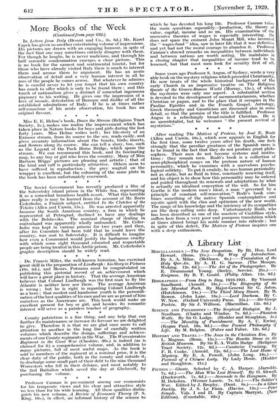After reading The Motives of Proteus, by Jose E. Bodo
(Allen and Unwin, 16s.), which now appears in English for the first time, some twelve years after his death, One feels strongly that the peculiar greatness of the Spanish races is to be found in the fact that they do not produce great philo- sophers. Their men do not become systems and institu- tions: they remain men. Rod6's book is a collection of semi-philosophical essays on the protean nature of human personality, which he examines with a marvelous psycho- logical subtlety. To put it crudely, he sees human personality not as static, but as fluid in time, constantly renewing itself, and his object is to show how this personality may be ordered and guided throughout its renewals and adaptations by what is actually an idealized conception of the will. So for him Goethe is the modern man's ideal, a man "governed by a taincinle of constant self-renovation." Rod6's book com- bines something of the native Spanish contemplative and mystic spirit with the élan and optimism of the new world. The range of his knowledge and the intricacy of its sympathies are like deep calling unto deep. Unfortunately Rode), who has been described as one of the masters of Castillian style, suffers here from a very poor and pompous translation which at times almost brings his noble manner into ridicule ; but in spite of this defect, The Motives of Proteus inspires one with a deep enthusiasm.








































 Previous page
Previous page